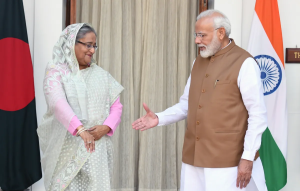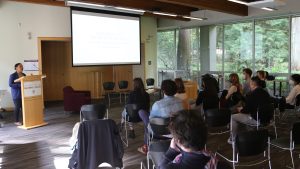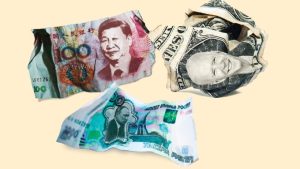Bangladeshi PM’s visit to India sends a “positive message,” says visiting Prof. Swaran Singh
Bangladeshi PM Sheikh Hasina’s upcoming trip to India will be a highlight of the nations’ golden chapter, says visiting Prof. Singh. “These examples of the changing nature of their bilateral relations have lessons and implications for the larger region.”
Pelosi’s visit could derail US–China compromise over Taiwan: Prof. Yves Tiberghien and Visiting Prof. Swaran Singh write in East Asia Forum
“The delicate diplomatic compromise of constructive ambiguity over Taiwan’s status initiated by former US national security advisor Henry Kissinger and Chinese premier Zhou Enlai in 1972 is fraying beyond repair,” Prof. Yves Tiberghien and Visiting Prof. Swaran Singh write. “We are witnessing a ratcheting up of the struggle between ideational commitments to the rival principles of democracy and national sovereignty.”
Photos from our Graduate Research Conference
UBC Political Science would like to congratulate our Graduate Students, who put together a wonderful conference in May. We would particularly like to thank Conference Chair Katelynn Kowalchuk and Keynote Speaker UBC Professor Genevieve Bates.
Prof. Yves Tiberghien and Christina Song: South Korea’s foreign policy faces many challenges
South Korea’s recently-elected President Yoon Suk-yeol “faces the same challenge his predecessor faced — balancing the dual demands of trade relations with China and security alignment with the United States,” write Song and Prof. Tiberghien.
The new Canada-Denmark Hans Island border sends a signal to the world, says Prof. Michael Byers
Prof. Michael Byers says that invasion of Ukraine created the “right moment” for the countries to handle the issue of dividing Hans Island between Canada and Denmark: “there’s no significance of the border, except the signal it sends to the world that we can resolve our disputes in a friendly way.”
Pandemic and Putin turn UBC Political Science student into war correspondent
UBC Political Science student Anastasiia Lapatina has spent the last four months covering Russia’s invasion of her homeland, Ukraine, while studying political science full-time.
Prof. Yves Tiberghien comments on the implications of Huawei, ZTE ban in Canada
The recent Huawei and ZTE bans could further strain the Chinese-Canadian relationship, both politically and economically. “There have been signals that this decision has been coming for years,” Prof. Tiberghien said. “This will not be a shock to the system. If anything it will be a ripple in the bigger picture.”
Prof. Jenny Peterson awarded funding for Intergenerational Connections & Futures for Afghan Scholars Program
Part of the $1.096 million dollar grant from the International Development Research Centre will go towards connecting Afghan students with Afghan scholars and activists to discuss possible ‘pathways’ for a socio-politically forward looking Afghanistan through Dr. Jenny Peterson’s “Intergenerational Connections and Futures” project.
Prof. Yves Tiberghien quoted on the eroding US-led liberal international order in Outlook Business
“Twenty-one per cent of global GDP has changed hands from developed to emerging economies since 2000 (14% of which has gone to China). It means that the West cannot dominate all global institutions and rules any longer. But, the US itself under Donald Trump came to question its leadership role in that order and decided to give up on all institutions and global rules it created,” says Prof. Tiberghien.
Vladimir Putin, the czar of macho politics, is threatened by gender and sexuality rights
Putin’s regime has increasingly relied on very conventional gender and sexual norms. Prof. Lisa Sundstrom co-wrote about the connection between Russian president Vladimir Putin’s animosity toward Ukraine and gender and sexuality rights in Russia and around the world.









